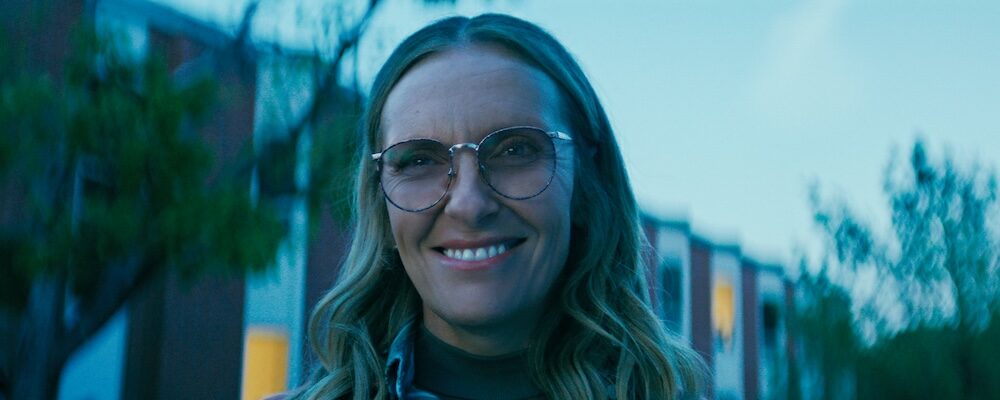‘Wayward’: Troubled Teens Attempt to Leap Over the Cuckoo’s Nest in Mae Martin’s Eerie Psychological Thriller
Tony Sokol
There is no end to the torments inflicted on teenagers for dark entertainment. Detention in Netflix’s “Wayward” offers to take away the pain, along with any memory, personality quirk, or smirky smile that goes along with it. For the students who take the leap, the possibilities are endless. It’s the crash that kills you.
Brought to us by stand-up comedian and “Feel Good” creator Mae Martin, this eight-episode mystery-thriller is set at Tall Pines Academy, a therapeutic boarding school for troubled teens in the fictional town of Tall Pines, Vermont. For Tall Pines Academy founder and lead counselor Evelyn Wade (Toni Collette), teens are no trouble at all. For the new deputy in town, Alex Dempsey (Martin), and his pregnant wife, massage therapist and fellow counselor Laura Redman (Sarah Gadon), kids are more problematic. Especially since the house they live in was a gift from the founder of the academy, which seems to be the only school in town.
Set in 2003, the insular and isolated town of Tall Pines appears an idyllic place to raise children. All the neighbors are friendly, welcome the couple with gifts, and are irrationally thrilled beyond conceivable capacity with the very idea of an impending baby. Alex’s partner at the police station, Dwayne (Brandon Jay McLaren), grew up with Laura, both graduating from the mysterious academy on the outskirts of town.
Evelyn, who personally treated both alumni from the break-down phase to the final “Leap” step which leads to institutional freedom, presents herself as a pioneering youth counsellor with “ground-breaking therapeutic techniques.” Wade is undeniably charismatic, more of a guru than a new age holistic teenage counselor. Her therapy is brainwashing, and most of the kids are fine with that. It beats character-building wilderness boot camps and the long wait for foster parents.
We see the Tall Pines facility through the eyes of two 16-year-old students: Abbie (Sydney Topliffe) and Leila (Alyvia Alyn Lind). They are lifelong best friends branded bad kids at their Toronto high school. Neither a threat to herself nor society, Abbie is bundled up and trundled off in the middle of the night to be dumped unceremoniously like an escaped convict. Leila breaks into the highly guarded facility, is caught with a small amount of cocaine, and detained until her mother can be coerced into paying the school’s exorbitant admission fee. If none of that is scary enough, she has to take out a reverse mortgage to do it. The horrors never cease.
As expected, the school treats its students like inmates. They are forced to wear matching uniforms, eat matching brown food, and memorize fastidiously strict rules. Students aren’t allowed to touch each other, and squealing is rewarded. Snitches are called Pigeons, and ratting out roommates carries many privileges. The kids aren’t the only people at the school who are dehumanized, staff members get official nicknames like “Mule” (Tricia Black) and “Rabbit” (Tattiawna Jones). The atmosphere is sinister. The secrecy is explicit. The rural setting heightens the conspiratorial subtext, which is compounded by the constant and obvious presence of machines for surveillance and control.
The horror comes because Evelyn has genuine faith in her mission, to the point of myopic obstinance. She believes she treats the children with respect, acting for what is best for them. Evelyn draws from her own traumatized past, and rejects suppression as a survival tactic. If only all the students survived. Laura’s power emanates from trauma and revenge. Both psychologists weaponize psychological exploration, conjuring horror through different approaches to systematic institutionalization, and turning the administration of care into chilling acts of mental abuse.
There are so many nods to “One Flew Over the Cuckoo’s Nest,” it has to be acknowledged. Leila is told to stop trying to be the next Jack Nicholson. Even the “Lord of the Flies” tribute episode, “Mirror,” where the inmates take over the asylum, fizzles into a puddle of apathetic acceptance as the children melt into the fetal position of controlled compliance. This represents Nicholson’s failed attempt to escape, without the physical exertion of lifting a fountain. Collette, a cinematic horror icon since “The Sixth Sense” and “Hereditary,” channels Nurse Ratched to play Evelyn Wade. Her demeanor is removed, all-knowing, and as relaxing as a forcibly injected sedative.
The entire focus of “Wayward” is as removed as Collette’s performance. This series features thrilling scenarios which are muted by emotional distance. Each revelation is painstakingly revealed, with no cathartic sense of discovery. In spite of an effectively malevolent mood, consistently off-kilter tone, and enough false leads and subplots to trigger mass cognitive dissonance, “Wayward” offers little payoff, except hope that the next generation of Tall Pines Academy graduates will benefit from long-term immersive therapy.
“Wayward” begins streaming Sept. 25 on Netflix.

